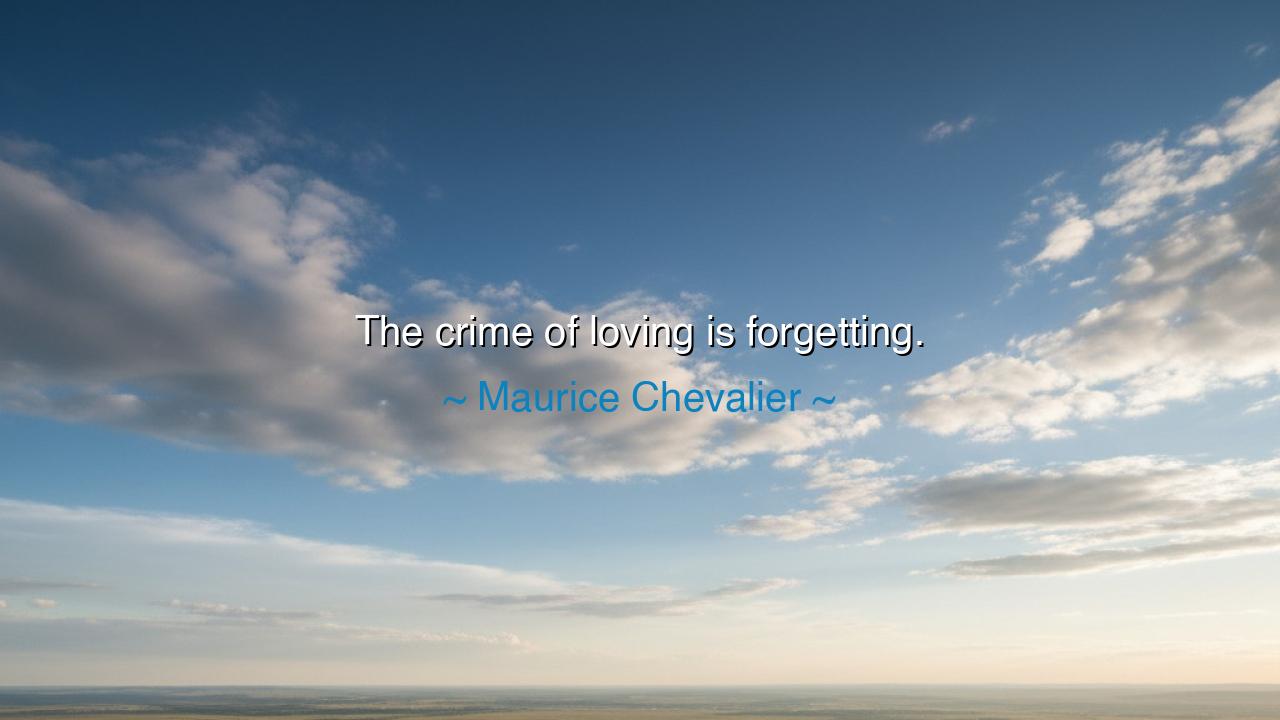
The crime of loving is forgetting.






Maurice Chevalier once said, “The crime of loving is forgetting.” These words, though simple, carry the weight of centuries of human longing. For in them lies the great paradox of the heart: that to love is to remember, and to forget is to betray the very essence of love itself. The ancients understood that love is not a fleeting flame, but a sacred fire tended by memory. To forget is to let that fire die — not in rage or sorrow, but in cold neglect, which is the cruelest end of all.
When Chevalier spoke of forgetting as the crime of love, he was not accusing the lover of malice, but of surrender — of allowing time, distraction, and weariness to erode devotion. Love, in its truest form, is remembrance: remembrance of shared moments, of sacrifices made, of hearts once intertwined. To forget these is to deny the journey that once gave life its warmth. The soul that forgets its beloved, whether living or lost, commits a silent betrayal — not against the other, but against its own humanity.
Think of Penelope and Odysseus, separated by war and sea. Twenty years she waited, her heart steadfast, weaving and unweaving her tapestry to keep hope alive. Her faith was her memory; her memory, her love. She could have forgotten — the world would have forgiven her. Yet she remembered, and in remembering, she kept his soul alive across oceans. Odysseus returned not to beauty or youth, but to the one heart that had not forgotten him. In her, love had not been a crime; it had been a covenant.
So too, in our own time, many fall into the crime of forgetting — not with ill intent, but through the quiet corrosion of routine. Lovers forget why they first cherished each other; children forget the sacrifices of their parents; friends forget the vows once made in youth. Forgetting turns love into habit, and habit into emptiness. The ancients would say that forgetting is the death not of love itself, but of its soul. The body of affection may remain, but its spirit fades like an echo in a hollow hall.
Yet memory is not only the keeper of love — it is the act of love itself. To remember a gesture, a word, a glance, is to keep a fragment of the beloved within you. Even when loss comes — and it always comes — the memory becomes the proof that love once lived. The poet Dante, wandering through the shadows of exile, never forgot Beatrice. Though she had long departed this world, he carried her image as his compass, his muse, his salvation. His remembrance turned mortal affection into immortal art. Thus, in remembering, he redeemed the human heart from the crime of forgetting.
But Chevalier’s warning is not meant to wound; it is meant to awaken. He reminds us that love is not sustained by passion alone, but by conscious remembrance. To love is to keep alive — to revisit the sacred moments that shaped the bond, to speak the old words again, to look upon the familiar face and still see wonder. The one who remembers keeps the thread of love unbroken through time’s relentless march.
Therefore, let every soul take heed: never forget those who have given you warmth, who have walked beside you, who have shared their light when yours grew dim. Write their names not only in letters, but upon your heart. In the stillness of night, recall their laughter; in the silence of absence, speak their names softly, so that love itself will not vanish from the world.
For the greatest virtue of the heart is remembrance, and the greatest sin is forgetting. To remember is to love again; to forget is to let love die. So keep your memories sacred, guard them as relics of the divine within you. For in remembrance, love becomes eternal — untouched by time, unbroken by death, and untainted by the crime of forgetting.






AAdministratorAdministrator
Welcome, honored guests. Please leave a comment, we will respond soon